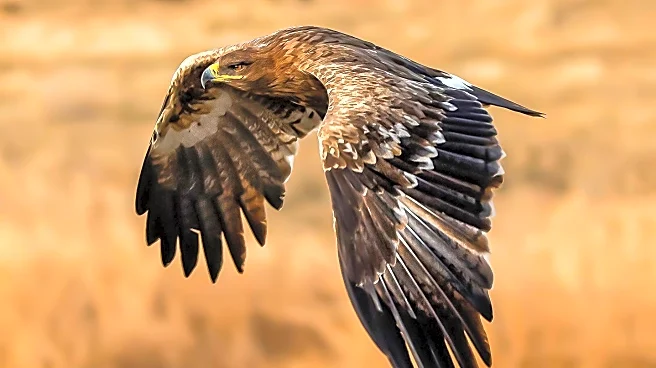What's Happening?
A group of second-grade students from Edith Bowen Laboratory School in Utah had an educational outdoor experience guided by a red-tailed hawk. During a nature walk at King’s Nature Park, the students, led by Dr. Joseph Kozlowski and naturalist Jack Greene, observed the hawk as it followed them throughout their journey. The students, equipped with binoculars, were excited to spot the hawk and other birds like Black-Capped Chickadees and House Sparrows. The hawk, which landed on a post, became a focal point of the day, providing a real-world learning opportunity about wildlife and nature. The event was part of an outdoor education initiative aimed at fostering a connection with nature among young students.
Why It's Important?
This event highlights the importance of outdoor education in fostering environmental awareness and appreciation among young students. By engaging directly with nature, students can develop a deeper understanding of wildlife and ecosystems, which is crucial for cultivating future generations of environmentally conscious individuals. Such experiences can enhance observational skills, critical thinking, and a sense of stewardship for the natural world. The presence of the hawk provided a unique, hands-on learning opportunity that textbooks alone cannot offer, potentially inspiring students to pursue further studies or careers in environmental science and conservation.
What's Next?
The success of this educational outing may encourage more schools to incorporate similar outdoor learning experiences into their curricula. Educators and environmentalists might collaborate to design programs that integrate wildlife observation with classroom learning, thereby enriching the educational experience. Additionally, this could lead to increased advocacy for preserving natural spaces that serve as outdoor classrooms, ensuring that future students have the opportunity to learn in and from nature.
Beyond the Headlines
The event underscores the broader cultural and educational shift towards experiential learning, where students learn by doing and observing rather than through traditional classroom methods alone. This approach can lead to more engaged and motivated learners, who are better equipped to tackle complex environmental issues. Furthermore, it highlights the role of educators like Dr. Kozlowski in pioneering innovative teaching methods that connect students with the natural world, fostering a lifelong appreciation for the environment.









